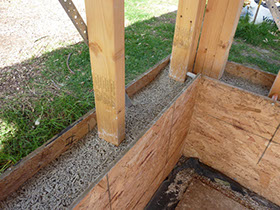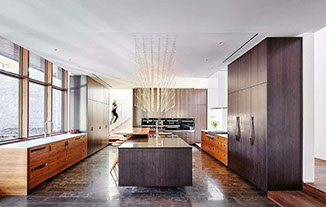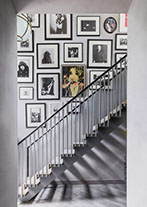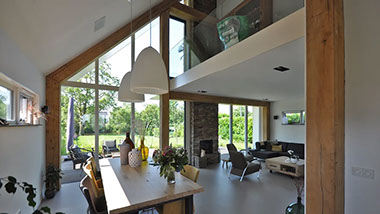Brief:
Create a cost, construction and time efficient, low carbon, super-energy efficient new-build with broad market appeal.
Proposal:
Occupying a modest 0.1ac infill plot, the design is to be an ultra low carbon hempcrete insulated timber frame four bedroom chalet bungalow with local stone foundations and plinth, finished with lime render, vertical timber louver cladding and light weight recycled car tire roof tiles.
Hempcrete eco house
Dorset: 0.1ac (0.04ha)
February 2020: Viewside: Digital model:
Light study : Build stages
Studio Peel
Architectural features
• Hempcrete & timber frame construction
• Foam glass insulated sub-floor
• Bespoke timber louvre cladding / shading
• Off set privacy patio position
• Light weight recycled car tire roof tiles
• Separate integrated carport, shed & sauna
and solar panel roof
Energy features
• Ultra low energy use
• Triple glazing
• Air source heat pump
• Heat battery water heating
• Rainwater harvesting
• House & carport solar roof panels
• Electric car charging and battery storage
Other significant features
• Hygroscopic, hypo-allergenic environment
• Consistent internal ambient temperature
[without heating].
• Decentralised mvhr / pvhr
Project status
On site: Expected completion: Spring 2021

April 2020: Exterior 3d visualisations
Beautiful exterior cgi visualisation work created by Studio Peel, enabling further design development, construction and cost saving solutions prior to final sign offs, placing orders and commencing construction works.
November 2019
Viewside: Services






Location plan
Isometric site plan
Elevations
Plans
Typical wall section
Systems
<
>
Hempcrete:
As a building material the woody centre of the hemp plant 'hemp-shiv' is mixed with lime and water to form 'hempcrete', which is cast, sprayed, or installed in pre-cast blocks typically around a structural timber frame.
Inherently hygroscopic and damp free a typical build-up is finished with lime render, cladding, breathable paints, or even left raw with no requirement for a vapour barrier.


Hemp-shiv
Hempcrete casting
Properties:
At 350mm thick, hempcrete achieves exceptional insulation and thermal mass properties, with a typical u-value of 0.17 W/m2K, as well as a thermal mass capable of maintaining an internal ambient temperature of 14ºc (56ºf) irrespective of external temperature, ultimately resulting in minimal heating requirements and ultra-low fuel bills.
And, because the entire build up is breathable, unlike most passivhaus systems, mechanical-ventilation-heat-recovery, MVHR, is also not essential.

'Better than' carbon negative!'
As well as excellent insulation and thermal mass properties, what set hempcrete above almost all other building fabric choices for this project was that it also embodies more carbon than it takes to produce. And continues to actively capture carbon over the life time of the building as 'it breathes'.
With construction, operation and maintenance of buildings responsible for around 60% of the UK's total carbon emissions, hempcrete along with other commercially 'grown' building materials could offer truly powerful game changing potential.



Interior mood
design@number39.co.uk
+447940925738
